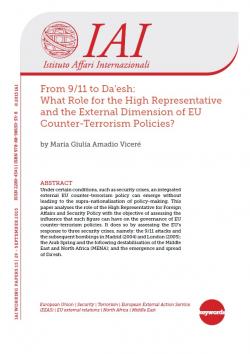From 9/11 to Da'esh: What Role for the High Representative and the External Dimension of EU Counter-Terrorism Policies?
Una politica estera dell'Ue per la lotta al terrorismo può emergere in determinate circostanze, senza che ciò porti ad una sovranazionalizzazione delle politiche dei paesi europei. Questo studio analizza il ruolo dell'Alto rappresentante per gli affari esteri e la politica di sicurezza, con l'obiettivo di valutarne l'influenza sulla governance delle politiche antiterrorismo dell'Ue. Lo fa valutando la risposta dell'Unione a tre crisi: gli attacchi dell'11 settembre e i successivi attentati di Madrid (2004) e di Londra (2005); la primavera araba e la successiva destabilizzazione in Medio Oriente e Nord Africa; e infine la nascita e il diffondersi dello Stato islamico.
Documento preparato per l'Istituto Affari Internazionali (IAI), settembre 2015. Versione precedente presentata al seminario “Euro-Mediterranean Security: Can New Dynamism Be Injected in the EU Mediterranean Policy?”, tenutosi presso l'Institute of European Studies dell'Università di Malta il 13 maggio 2015.
-
Dati bibliografici
Roma, IAI, settembre 2015, 22 p. -
Numero
15|29 -
ISBN/ISSN/DOI:
978-88-98650-53-8
Introduction
1. The High Representative’s institutional basis and the EU external counterterrorism policy
2. The first High Representative Solana: steering the ship towards unexplored waters
3. Lady Ashton’s mandate as High Representative: when terrorism was at the doorstep, but still asking for permission
4. Mogherini’s tenure as High Representative: towards an enhanced integration in EU counter-terrorism policies?
Conclusions
References




